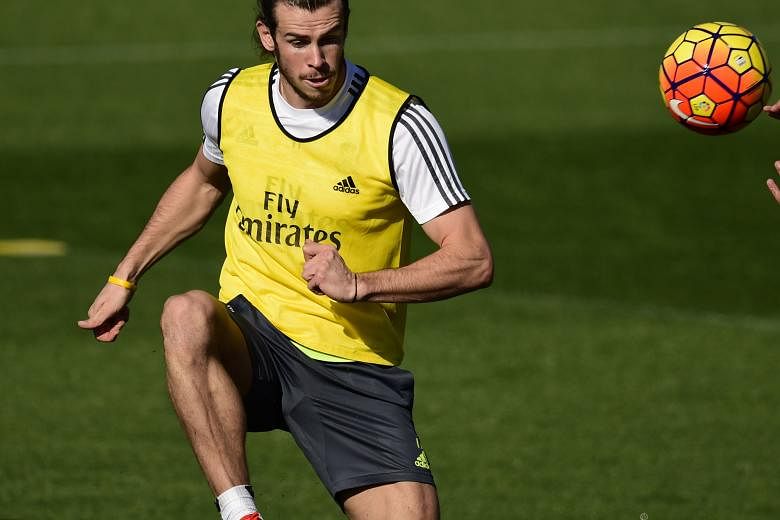LONDON • The world's leading football clubs have been warned that details of their transfer dealings and player contracts will continue to be made public on a daily basis over the coming weeks by the controversial website that claims to be campaigning for greater transparency in the global game.
A source at Football Leaks has told The Times that it has published only 1 per cent of the documents that it has obtained featuring clubs and players from all over the world, and that the website is preparing to step up its activities.
Chelsea, Manchester United, Manchester City, Tottenham Hotspur and Arsenal have all been victims of Football Leaks as confidential details of their transfers have been published.
In the past week, the full contractual details of Gareth Bale's move to Real Madrid, Chelsea's loan agreement with Monaco for Radamel Falcao and Mesut Oezil's transfer from Real to Arsenal have been revealed by the website. It first came to prominence this month when it published the full breakdown of Anthony Martial's move from Monaco to United.
The Times has been told that Football Leaks has accumulated 500 gigabytes of data - the equivalent of approximately 50 milion pieces of paper depending on the type of file - and is working with volunteers to sift through thousands of documents. It says that the plan is to publish all of them, with its next expose believed to centre on the uncovering of a South American investment group that is using Dutch tax loopholes to send money to offshore accounts in Panama.
-
500GB
-
Amount of data that Football Leaks has accumulated, which translates to about 50 million pieces of paper.
"We will publish every single document," a source said.
The identity of those working for Football Leaks is shrouded in mystery and has aroused controversy amid allegations that the group uses computer hackers and has attempted to extort money from its victims.
The website is hosted in Russia and is believed to use a variety of different Internet servers to maintain its anonymity, many of which are hosted in Eastern Europe.
It has been alleged that it has links to a group of known hackers, Portuguese Anonymous, some of whose members were arrested last year after an alleged cyber attack on the website of the University of Lisbon.
Football Leaks denies that there is a link, describing such claims as "ridiculous".
It began publishing transfer documents last year in response to what it believed to be a lack of transparency in Portuguese football after a frenetic summer transfer window, largely focused on the activities of Sporting Lisbon.
The first document it posted, in September, concerned Sporting's alleged use of money from Angola to fund transfers channelled by a club called Recreativo da Caala, which led to a further investigation into mysterious investors in Portuguese football.
Many Portuguese clubs use third-party investment to build their squads, leading to concerns that outside interests could be influencing clubs' decisions despite Fifa banning third-party ownership in May last year.
Many of Football Leaks' initial revelations were focused on Sporting, some of whose transfer funding was provided by Doyen Sports, a third-party investment fund with offices in London and Malta.
In October, Doyen reported Football Leaks to the Portuguese police, claiming that it had been the victim of a cyber attack and that it had received a demand for a bribe of between €500,000 (S$771,000) and €1 million to destroy its confidential documents.
Doyen was allegedly provided with an address and a phone number for Football Leaks' lawyer, based in Oporto, but it contacted the police. A Portuguese police source confirmed to The Times that they are investigating Football Leaks, and believe one of the group's key figures is based in Budapest.
Football Leaks denies making any contact with Doyen and insists that it did not hack Doyen. It points out that many of the documents it has published post-date the alleged cyber attack, while many of its most recent publications have nothing to do with Doyen.
Football Leaks describes itself as "a newly-formed organisation in pursuit of truth", and claims that it will not stop until it achieves its goal of a reformed transfer system, with a more limited role for agents and investment funds and a public database detailing all transfer fees and player wages.
It insists that its documents are provided by a growing circle of informants, although experts in intelligence gathering have told The Times that the volume of data that Football Leaks claims to be storing is indicative of at least some hacking.
None of the big clubs whose contracts have been published have questioned the authenticity of the documents, although there are some anomalies. Sources who have seen some of the other documents in Football Leaks' possession say some are forgeries, while others have been amended, suggesting that the material comes from a range of informants rather than one orchestrated hack.
Another curiosity is that despite the initial focus on Doyen, nothing has been published about its most high-profile client, Neymar, the Barcelona striker whose 2013 transfer from Santos is the subject of a Spanish fraud investigation. Neymar denies any impropriety.
Fifa has welcomed the greater transparency created by the leaks, but questioned its methods and has yet to have any contact with it.
THE TIMES, LONDON

